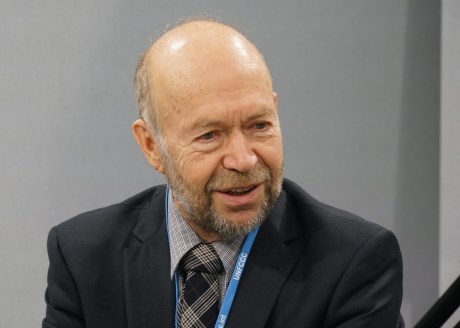Four leading climate scientists called for a major expansion of nuclear power as an essential measure to avoid dangerous man-made climate change over the next century. Speaking at the COP21 climate conference in Paris yesterday, James Hansen, Tom Wigley, Ken Caldeira and Kerry Emanuel urged world leaders to ensure that nuclear power is deployed alongside renewables.
 |
| James Hansen speaking at the press conference (Image: World Nuclear Association) |
The scientists outlined how only a combined strategy employing all the major sustainable clean energy options - including renewables and nuclear power - can prevent the worst effects of climate change by 2100.
They stressed their assessment was based not on ideology but on observations from the latest climate research, including rises in sea levels, ocean acidification and ice sheet collapse. Wigley, of the University of Adelaide, said that the four had spent their careers studying the fundamental science of the climate system with no ulterior motive other than to understand it. "That study of the climate system has very strongly led us to the conclusion that we are incurring unacceptable risks for future generations," he said.
Hansen, a professor at the Columbia University Earth Institute in the USA and a former head of the NASA Goddard Institute for Space Studies, said the world is in at an "extremely dangerous" point from the real threat of irreversible climate impacts if it continues to heat up. Such irreversible impacts include the collapse of ice sheets resulting in sea level rises of several metres, and widespread extermination of certain species. He cited estimates from the United Nations Intergovernmental Panel on Climate Change that if the planet stays on a "business as usual" track, by the end of this century a quarter to half of the species on Earth will face extinction.
"It's absolutely 100% certain that we've got a very dangerous situation and for us to say we are not going to use all the tools that we have to try to solve is crazy," Hansen said. "Nuclear power - next generation nuclear power especially - has tremendous potential to be a big part of the solution."
Wigley called for a "fair and balanced" assessment in deciding energy strategy, eschewing ideology and preconceptions. "We're not promoting nuclear energy - we're promoting a level playing field," he said.
Caldeira, climate scientist at the Carnegie Institute for Science and a former opponent of nuclear power, said that nuclear was the only technology capable of providing carbon-free power on the scale required by modern civilisation. Emanuel, professor of atmospheric science at the Massachusetts Institute of Technology, said that he had no personal preference for any particularly energy source. It is possible to scale up solar and wind capacity rapidly, he said, but the use of such renewable energy sources was ultimately limited by intermittency issues. "The numbers don't add up unless you put nuclear power in the middle," he said.
Hansen said that countries with rapidly growing energy sectors, such as China and India, were using mostly coal through necessity. "You can't raise people out of poverty without energy," he said, and called on Western nations to help industrializing countries to find a clean alternative to coal. "If we have carbon-free electricity in all countries we've solved the climate problem," he said.
Hansen spoke in support of carbon pricing to provide a market signal away from fossil fuels towards the most cost-effective low-carbon solutions.
COP21 - the 21st Conference of the Parties to the United Nations Framework Convention on Climate Change - is taking place in France from 30 November to 11 December, with the aim of delivering a new universal climate change agreement leading to a low-carbon, sustainable future that keeps a global temperature rise under 2 degrees Celsius.
Researched and written
by World Nuclear News







_97013.jpg)






